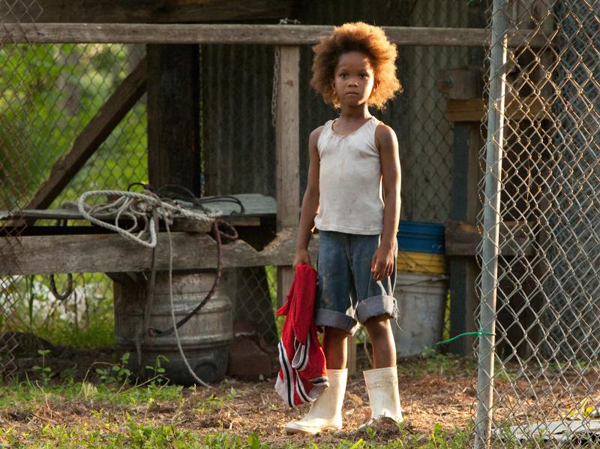
Quvenzhané Wallis as Hushpuppy (Jess Pinkham/Fox Searchlight)
![]() Composer Dan Romer has said in an interview that when composing this film’s score alongside Benh Zeitlin, who also directed this unimaginably unique film, it became necessary to think exclusively from the perspective of the main character. Hushpuppy is the charismatic six-year-old heroine who imbibes the harshly dictated life lessons of her ailing single father in a fictionalized Louisiana swamp called “The Bathtub.” This nebulous, impoverished hinterland lies, like New Orleans’ Ninth Ward, below sea level. The memorable score is not the only element that uses Hushpuppy’s perspective, and it’s far from the only successful element in this exceptional movie, which has already garnered accolades for both directing and cinematography at Sundance, and for best first film at Cannes earlier this year.
Composer Dan Romer has said in an interview that when composing this film’s score alongside Benh Zeitlin, who also directed this unimaginably unique film, it became necessary to think exclusively from the perspective of the main character. Hushpuppy is the charismatic six-year-old heroine who imbibes the harshly dictated life lessons of her ailing single father in a fictionalized Louisiana swamp called “The Bathtub.” This nebulous, impoverished hinterland lies, like New Orleans’ Ninth Ward, below sea level. The memorable score is not the only element that uses Hushpuppy’s perspective, and it’s far from the only successful element in this exceptional movie, which has already garnered accolades for both directing and cinematography at Sundance, and for best first film at Cannes earlier this year.
At just about every turn you’ll find something to praise in Beasts, from its wildly imaginative sets, creative camera setups, and cast of unforgettable characters, to its original score, which is one of my favorites in recent memory. The film is based on the surrealist world first developed in a 2008 short called “Glory at Sea” by Zeitlin and his collaborators (who call themselves Court 13, a collective of young, like-minded filmmakers who worked on the film in various capacities from producers to assistant directors and more). We stay mostly in the folksy swampland where Hushpuppy (Quvenzhané Wallis) lives in a ramshackle trailer with her father Wink, until the area is flooded out and they are forced into what resembles a FEMA processing center—a sterile, dehumanizing environment where Hushpuppy is given a dress and her father is placed under a series of tests to determine his deteriorating physical condition. The abrupt transition from Americana familiarity in the dark green and brown of the bayou to the cold unnatural fluorescence of the government camp is palpable. Zeitlin implies the camp is more harmful, at least to one’s soul, than the flooded area itself.
Nothing in the actual filming undermines the believability of the world Zeitlin creates here. Cinematographer Ben Richardson brings us along on the visual journey, discovering amazing details in the half-real, half-imagined watery landscapes. Production designer Alex DiGerlando and costume designer Stephani Lewis are likewise in sync with the rest of the team, showing us a world that’s completely distinctive, yet always feeling somehow close and familiar. You will not be able to take your eyes from the screen.
The only stumble is the plot itself, which becomes lost amid all the wonderment and emotion happening at each moment. Hushpuppy must learn to fend for herself as Wink’s health fails and a storm floods their home. Beyond this basic premise, the details of the story are (seemingly intentionally) vague. Zeitlin cast a range of non-professional actors, chief among them Dwight Henry, who plays Wink, and I’m sure that merely capturing their raw energy on screen became much more important than maintaining a cohesive story. I found myself captivated as each magical moment happened before my eyes, whether it was Wink teaching Hushpuppy to catch catfish with her bare hands or Hushpuppy making a new friend over fried alligator or Wink impelling her to leave him after his grave diagnosis. But I never quite built much anticipation for the next moment. I felt like a child experiencing this tale for the first time, without expectations or even a sense of the appropriate order. In a film with a lot of complex social resonance, this story is quite simplistic, though what would feel like broad clichés in other films (the bonhomie of the ragtag bayou residents) feel appropriate in this modern day folk story.
It’s a treat just knowing that vibrant and imaginative films are still being made. It recalls the sensibility and holistic commitment of Jim Henson, or Guy Maddin perhaps. This is an attempt at creating something that doesn’t exist in our everyday lives, yet at the same time teaching us so much about them. The lessons we can learn from a six-year-old rapscallion in the fantasy playpen of downtrodden rural America are twofold. Hushpuppy and Zeitlin show us what it means to live in a particular community, and at the same time, what it means when we allow this society to be destroyed. It’s a story told through the eyes of a child, but only a grown-up will fully appreciate it.






Leave A Comment